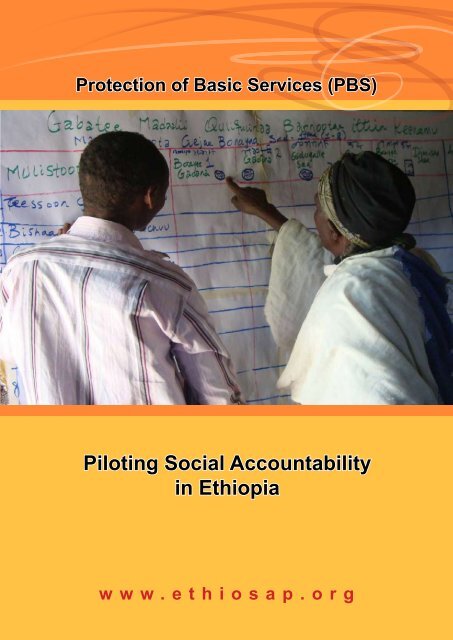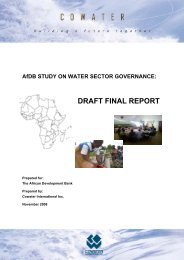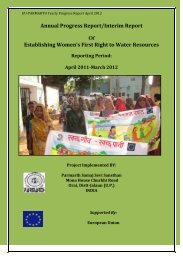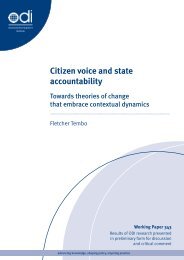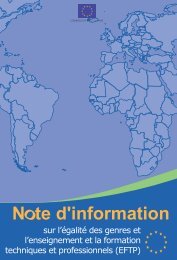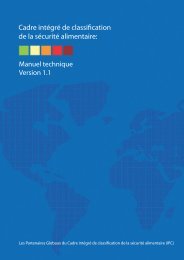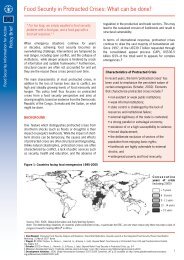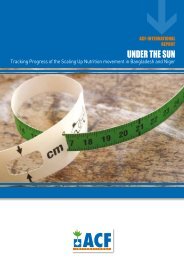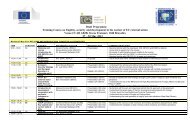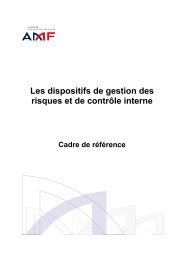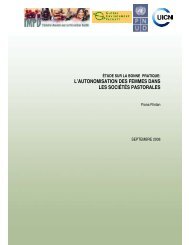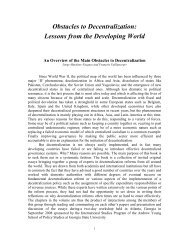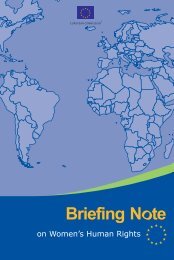Piloting Social Accountability in Ethiopia - Capacity4Dev
Piloting Social Accountability in Ethiopia - Capacity4Dev
Piloting Social Accountability in Ethiopia - Capacity4Dev
- No tags were found...
You also want an ePaper? Increase the reach of your titles
YUMPU automatically turns print PDFs into web optimized ePapers that Google loves.
1Protection of Basic Services (PBS)<strong>Pilot<strong>in</strong>g</strong> <strong>Social</strong> <strong>Accountability</strong><strong>in</strong> <strong>Ethiopia</strong>www.ethiosap.org
2<strong>Social</strong> <strong>Accountability</strong> - anchored <strong>in</strong> the ConstitutionConstitution of the Federal Democratic Republic of <strong>Ethiopia</strong>:Article 12:“1. The conduct of affairs of the government shall be transparent.”“2. Any public official or elected representative is accountable for any failure<strong>in</strong> official duties.”Section 4 Article 50:“State government shall be established at state and other adm<strong>in</strong>istrativelevels that they f<strong>in</strong>d necessary. Adequate power shall be granted to thelowest unit of government to enable the people to participate directly <strong>in</strong> theadm<strong>in</strong>istration of such units.”
3<strong>Pilot<strong>in</strong>g</strong> <strong>Social</strong> <strong>Accountability</strong>The Protection of Basic Services (PBS) Program promotes socialaccountability <strong>in</strong> <strong>Ethiopia</strong>. Component 4 of PBS, termed the <strong>Ethiopia</strong>n <strong>Social</strong><strong>Accountability</strong> Project (ESAP), supports 12 civil society organizations and 40partner<strong>in</strong>g organizations with fund<strong>in</strong>g and capacity build<strong>in</strong>g for implement<strong>in</strong>gpilot projects.The pilot projects focus on the effective delivery of basic services bypromot<strong>in</strong>g dialogue between service users, government bodies, and publicservice providers. The <strong>Ethiopia</strong>n <strong>Social</strong> <strong>Accountability</strong> Project has the overallobjective of strengthen<strong>in</strong>g the use of social accountability approaches bycitizens and civil society organizations (CSOs) <strong>in</strong> <strong>Ethiopia</strong> to make servicedelivery more effective, efficient and accountable.What is <strong>Social</strong> <strong>Accountability</strong>?<strong>Social</strong> <strong>Accountability</strong> is a pr<strong>in</strong>ciple of good governance that relies on civicengagement. The <strong>Ethiopia</strong>n <strong>Social</strong> <strong>Accountability</strong> Project builds civicengagement by us<strong>in</strong>g a range of <strong>in</strong>struments and tools, such as participatorybudget<strong>in</strong>g, monitor<strong>in</strong>g of public service delivery, and citizens’ report cards.
4<strong>Social</strong> <strong>Accountability</strong> -Part of Government’s Good Governance InitiativesThe <strong>Ethiopia</strong>n <strong>Social</strong> <strong>Accountability</strong> Pilot project is based on ongo<strong>in</strong>g effortsof the government to build a decentralized governance system <strong>in</strong> <strong>Ethiopia</strong>.It is particularly anchored on the follow<strong>in</strong>g pr<strong>in</strong>ciples of good governance aspart of the ongo<strong>in</strong>g civil service reform program of <strong>Ethiopia</strong>.1.2.3.4.5.Participation: Citizen’s have a right to participate effectively andmean<strong>in</strong>gfully <strong>in</strong> the affairs of their own development, either directly orthrough legitimate <strong>in</strong>termediate <strong>in</strong>stitutions that represent their <strong>in</strong>terests.Local development plans shall <strong>in</strong> particular, reflect the voices, <strong>in</strong>terestsand development needs of the community. Communities shall be providedwith adequate space to participate <strong>in</strong> the plann<strong>in</strong>g, execution andmonitor<strong>in</strong>g of development programs.Responsiveness: Public services shall reflect and be responsive tocitizen’s needs and <strong>in</strong>terests. The response should be prompt, effectiveand efficient as far as resources and capacities allow.Transparency: Public decision mak<strong>in</strong>g shall be conducted <strong>in</strong> a mannerthat is transparent based on free flow of <strong>in</strong>formation. Adequate publicservice <strong>in</strong>formation concern<strong>in</strong>g service standards and entitlements shallbe directly accessible by the community to understand and monitor them.<strong>Accountability</strong>: Decision-makers <strong>in</strong> government are accountable to thepublic for their decisions and actions. Vertical and horizontal governmentstructures and systems are <strong>in</strong> place at all levels of adm<strong>in</strong>istration toensure compliance to government laws, regulations and policies.Efficient and effective delivery of public services: Public <strong>in</strong>stitutionsproduce results that meet citizen’s needs while mak<strong>in</strong>g best use ofresources.
5Protect<strong>in</strong>g Basic ServicesThe Protection of Basic Services (PBS) Program was established <strong>in</strong> June2006 by the Government of <strong>Ethiopia</strong> and <strong>in</strong>ternational development partners. 1PBS supports <strong>Ethiopia</strong>’s progress towards the Millennium DevelopmentGoals (MDGs). Its goal is to protect and promote the delivery of basicservices <strong>in</strong> health, education, agriculture, water and sanitation sectors by subnationalgovernments while deepen<strong>in</strong>g transparency and local accountability.<strong>in</strong> health, education, agriculture, water and sanitation sectors.The PBS consists of four components:Component 1: Protect<strong>in</strong>g the Delivery of Basic ServicesThe delivery of basic services is protected by provid<strong>in</strong>g funds to the FederalGovernment. The funds are then transferred to the regions and woredas(districts) through <strong>in</strong>tergovernmental fiscal transfers and block grant systems.Component 2: Deliver<strong>in</strong>g Basic Health ServicesFund<strong>in</strong>g is provided for the procurement of critical health commoditieswhich cannot be efficiently f<strong>in</strong>anced through the block grant mechanism. Ithas a specific focus on malaria control and capacity build<strong>in</strong>g activities forstrengthen<strong>in</strong>g procurement and logistics.Component 3: F<strong>in</strong>ancial Transparency and <strong>Accountability</strong>The component supports government-implemented activities at sub-nationallevels to significantly enhance transparency around public budget proceduresand foster broad engagement and strengthened voice and client power tocitizens and citizen representative groups on public budget processes andpublic service delivery. In addition it will strengthen <strong>in</strong>formation technologyand audit<strong>in</strong>g capacities.Component 4: <strong>Social</strong> <strong>Accountability</strong> ProjectBy engag<strong>in</strong>g citizens and civil society organizations <strong>in</strong> social accountability<strong>in</strong>itiatives, the project strengthens citizen voice and enhances theaccountability of public sector service providers. Pilot activities seek to buildsocial accountability capacities <strong>in</strong> the context of a decentralized servicedelivery. 21 Mention the PBs donors here2 Component 4 is f<strong>in</strong>anced by a World Bank managed Multi-Donor-Trust-Fund (MDTF). Donors?
6<strong>Pilot<strong>in</strong>g</strong> <strong>Social</strong> <strong>Accountability</strong> <strong>in</strong> <strong>Ethiopia</strong>The <strong>Ethiopia</strong>n <strong>Social</strong> <strong>Accountability</strong> Project was formed as a pilot <strong>in</strong>itiativeto test social accountability <strong>in</strong>struments <strong>in</strong> the <strong>Ethiopia</strong>n context. For<strong>in</strong>itial implementation, civil society organizations (CSOs) were selected asfacilitators.iTwelve lead CSOs were selected on a competitive basis to test socialaccountability these tools <strong>in</strong> cooperation with local CSOs, governments, andservice providers over the course of 18 months. The <strong>Social</strong> <strong>Accountability</strong>tools adopted by CSOs <strong>in</strong> the <strong>Ethiopia</strong>n <strong>Social</strong> <strong>Accountability</strong> Project<strong>in</strong>clude: the Community Score Card (CSC), the Citizen Report Card (CRC)and Participatory Budget<strong>in</strong>g (PB). Each procedure places emphasis on theInterface Meet<strong>in</strong>g as a key step preced<strong>in</strong>g jo<strong>in</strong>t Reform Agendas and ActionPlans.<strong>Social</strong> accountability tools implemented by CSOs were Community ScoreCard, Citizen reports Card and Participatory Budget<strong>in</strong>g, But as part of thepilot projects all CSOs <strong>in</strong>cluded Right Based Approaches, PerformanceMonitor<strong>in</strong>g, Interfaces, Participatory Plann<strong>in</strong>g, Implementation and Monitor<strong>in</strong>g.Participatory Groundwork and OrganizationCommunity Gather<strong>in</strong>gBasel<strong>in</strong>e Survey;Input Track<strong>in</strong>gMatrixInitial Meet<strong>in</strong>gProvider Self Evaluation, Focal GroupsCitizens’ ReportCard; CommunityScore Card, FocalGroupInterface Meet<strong>in</strong>gReform Agenda, Action Plan
7Community Score CardThe Community Score Card (CSC) is conducted at a community level. It isparticipatory tool for assess<strong>in</strong>g, plann<strong>in</strong>g, monitor<strong>in</strong>g, and evaluat<strong>in</strong>g basicservices.CSC consists of four basic elements:(1) Focus Group Discussion ofCommunity• Facilitators organize discussion<strong>in</strong> the community on access andquality of basic services.• Community members develop<strong>in</strong>dicators to evaluate theservices.• The group scores the serviceperformance accord<strong>in</strong>g to the<strong>in</strong>dicators.(2) Focus Group Discussion ofService Providers• Facilitators organize discussionof service providers on servicedelivery.• They develop <strong>in</strong>dicators for a selfevaluation. .• The group of service providersscores the own performance.(3) Interface Meet<strong>in</strong>gs andReform Agenda• Community members and serviceproviders present the results of theirassessments.• The participants discuss and analyzediscrepancies.• They elaborate a reform agenda with anaction plan for improv<strong>in</strong>g services by allstakeholders.(4) Implementation• Stakeholders steer and monitor jo<strong>in</strong>tly theimplementation of the action plan.The CSC can be used by government <strong>in</strong>stitutions, service providers, NGOsand community-based organizations. The goal of the CSC is to empowerservice users, <strong>in</strong>crease community participation, and to improve transparencyand accountability of service providers.
8Citizens’ Report CardThe Citizens’ Report Card (CRC) process <strong>in</strong>volves gather<strong>in</strong>g anddissem<strong>in</strong>at<strong>in</strong>g citizen feedback on the access and quality of services tofacilitate improvements <strong>in</strong> service delivery. The CRC is designed for a s<strong>in</strong>glelocality and can be used <strong>in</strong> both rural and urban areas. In the <strong>Ethiopia</strong>n <strong>Social</strong><strong>Accountability</strong> Project, CRCs are implemented by tra<strong>in</strong>ed CSOs’ enumaratorsthrough <strong>in</strong>dividual <strong>in</strong>terviews.1.Groundwork / Focus Group Discussions• Identify the scope of CRC• Make prelim<strong>in</strong>ary implementation plan• Design the questionnaire• Complete the sampl<strong>in</strong>g design2.Conduct<strong>in</strong>g the Survey• Select and tra<strong>in</strong> the enumerators and supervisors• Carry out the survey to satisfy the objectives of the CRC3.Analyz<strong>in</strong>g the F<strong>in</strong>d<strong>in</strong>gs• Determ<strong>in</strong>e key f<strong>in</strong>d<strong>in</strong>gs on availability, usage,satisfaction, etc.5.Improv<strong>in</strong>g the Services• Use the f<strong>in</strong>d<strong>in</strong>gs to agree on a reform agenda and anaction plan for improvements of service delivery6.Implementation• Monitor<strong>in</strong>g of the action plan implementation4.Interface Meet<strong>in</strong>g• CSOs select<strong>in</strong>g the CRC tool <strong>in</strong>ESAP have <strong>in</strong>corporated the <strong>in</strong>terfacemeet<strong>in</strong>g as the core step of CRC• CSOs established jo<strong>in</strong>t committees tofollow up the implementation of actionplans.The CRC was orig<strong>in</strong>ally designed to f<strong>in</strong>ish at the analyz<strong>in</strong>g the f<strong>in</strong>d<strong>in</strong>gs stage.However, ESAP has elaborated the tool to <strong>in</strong>clude an <strong>in</strong>terface meet<strong>in</strong>g sothat the focus becomes the dialogue between service users and serviceproviders with the aim to jo<strong>in</strong>tly improve basic services.
9Budget WorkThe <strong>Ethiopia</strong>n <strong>Social</strong> <strong>Accountability</strong> Project focused on help<strong>in</strong>g citizensunderstand public budgets. Five of the 12 projects utilized budget relatedtools, which entail participatory budget<strong>in</strong>g and/or public expenditure track<strong>in</strong>g.Participatory Budget<strong>in</strong>gThe process of Participatory Budget<strong>in</strong>g (PB) <strong>in</strong>volves stakeholders and/or<strong>in</strong>dependent <strong>in</strong>dividuals to exam<strong>in</strong>e and assess public budgets <strong>in</strong> relationto policy, preparation processes, implementation and outputs. The process<strong>in</strong>volves (i) <strong>in</strong>formation shar<strong>in</strong>g (ii) consultations <strong>in</strong> focus groups, allow<strong>in</strong>g forcitizens’ <strong>in</strong>put; (iii) collaborations for discussions among different groups; and(iv) citizen contributions to governments’ decision-mak<strong>in</strong>g.Budget Formulatione.g. Participatory Budget<strong>in</strong>gPerformance Monitor<strong>in</strong>ge.g. Community ScoreCard, Citizen Report CardCIVIC ENGAGEMENTBudget Review and Analysise.g. Budget Demystificationand Budget AnalysisExpenditure Track<strong>in</strong>ge.g. Public Expenditure Track<strong>in</strong>g(PET)Public Expenditure Track<strong>in</strong>gPublic Expenditure Track<strong>in</strong>g (PET) surveys the flow of resources (human,f<strong>in</strong>ancial, <strong>in</strong>-k<strong>in</strong>d) through various levels of government to observe how muchof the orig<strong>in</strong>ally allocated public resources reach each level.PET can track funds for basic services, such as funds for textbooks <strong>in</strong>primary education and funds for drugs <strong>in</strong> health cl<strong>in</strong>ics. It can stimulatereforms through access to relevant <strong>in</strong>formation and review<strong>in</strong>g prioritiesthrough <strong>in</strong>terface meet<strong>in</strong>gs of government representatives and communitymembers.
10Action for Self Reliance (AFSR)Pilot Project: Enhanc<strong>in</strong>g Citizen’s Engagement <strong>in</strong> <strong>Ethiopia</strong>’s Education SectorObjective:Sector:Tool(s):Improve education quality and gender equity through active <strong>in</strong>volvement, guidanceand engagement of communities and Parent Teachers Associations (PTAs) with the schoolsEducationCommunity Score CardsRegional Coverage:Region Woredas Sectors Implement<strong>in</strong>g PartnerOrganizationsAddisAbabaOromiaSNNPRNefas SilkLidetaAddis KetemaAradaKirkosWolisoSebetaAwasaAwassaChenchaEducationAction for Self Reliance (AFSR)Love for children Organization(LCO)Multi-Purpose CommunityDevelopment Project (MPCDP)Organization for Prevention,Rehabilitation and Integration ofFemale Street Children (OPRIC)Siiqee Women DevelopmentAssociation (SWDA)Action for Self Reliance (AFSR)Multi-Purpose CommunityDevelopment Project (MPCDP)Expected Outcomes:• Community’s demand for effective services, especially <strong>in</strong>the effort to reduce barriers to girls’ education, is expectedto improve through <strong>in</strong>creased awareness of their rightsand potential.• Empowerment of disadvantaged and vulnerablecommunity members.• Improved technical and management skills of thecommunity, schools and CSOs through tra<strong>in</strong><strong>in</strong>g andexperience shar<strong>in</strong>g visits.• Better understand<strong>in</strong>g of roles and responsibilitiesthrough cont<strong>in</strong>ued dialogue and communication amongcommunities, PTAs and CSPs with the schools.• Creation of a culture of tolerance, cooperation, ideashar<strong>in</strong>g and debat<strong>in</strong>g differences to reach a consensusfor future action.• Actions that encourage schools to <strong>in</strong>troduce newprocedures and practices that ensure greaterperformance and quality education for girls.For more <strong>in</strong>formation: www.ethiosap.org
Amhara Development Association (ADA)11Pilot Project: Dialogue and Information Flow for <strong>Accountability</strong> and Transparency (DIFAT)Objective:Sector:Tool(s):Promote <strong>in</strong>creased citizenship <strong>in</strong> governance as a means to improve social accountabilityand transparency <strong>in</strong> service delivery at local levelEducation, HealthCommunity Score Cards; Participatory Budget<strong>in</strong>gRegional Coverage:Region Woredas Sectors Implement<strong>in</strong>g PartnerOrganizationsAmharaRegionDebre Markos(Guzamm)DangelaFartaMetemaHealth andEducationAmhara Women’s Association(AWA), Green belt IntegratedCommunity Development Organization(GICDO), PACT <strong>Ethiopia</strong>(IPO <strong>in</strong> capacity build<strong>in</strong>g)Expected Outcomes:• Improved capacity of local communities and citizengroups to hold public service providers accountable andto claim budget transparency• Increased confidence and communication amonglocal communities, citizen groups, elected peoplesrepresentatives and government agencies throughenhanced citizen participation <strong>in</strong> local governance• Enhanced participation of local communities and CSOs/CBOs <strong>in</strong> public budget decisions and <strong>in</strong> service deliverymonitor<strong>in</strong>g• Improved l<strong>in</strong>kage and dialogue between governmentactors, communities and CSO at local levelFor more <strong>in</strong>formation: www.ethiosap.orgwww.ada.org.et
12Derash Relief & Development AssociationPilot Project: Citizens Engagement for Transparency, Responsiveness and <strong>Accountability</strong> for BasicServicesObjective:Sector:Tool(s):Promote the use of social accountability approaches by citizen, local CSOs andgovernments to make basic service delivery more effective, efficient and accountableEducation, Health, WaterCommunity Score Cards; Participatory Budget<strong>in</strong>gRegional Coverage:Region Woredas Sectors Implement<strong>in</strong>g PartnerOrganizationsSomaliSh<strong>in</strong>ila(Sh<strong>in</strong>ile)AishaWaterUgas Hassen Helsi Relief andDevelopment AssociationHarariSofiHakimWater andHealthPANE – Harari Regional ChapterOromiaFedisKombolchaHaromayaWater,Health andEducationWater andEducationEducationand WaterAction Aid <strong>Ethiopia</strong>Derash Relief and DevelopmentOrganization (DRDO)Expected Outcomes:• Improved capacity of CBOs, NGOs, and public serviceproviders on better basic service delivery• Enabled local communities, associations and CSOs tohold public service providers accountable• Increased participation of communities, CSOs andCBOs <strong>in</strong> public budget processes and <strong>in</strong> service deliverymonitor<strong>in</strong>g• Improved l<strong>in</strong>kages and communication betweengovernment actors and communities/CSOsFor more <strong>in</strong>formation: www.ethiosap.org
<strong>Ethiopia</strong>n Interfaith Forum for Development Dialogue and Action (EIFDDA)13Pilot Project: Improv<strong>in</strong>g Basic Services through Community Participation facilitated by Faith BasedOrganizationsObjective:Sector:Tool(s):Encourage the dialogue between service providers and community to improve basic publicservicesEducation, Health, WaterCommunity Score CardsRegional Coverage:Region Woredas Sectors Implement<strong>in</strong>g PartnerOrganizationsTigray Genta Aufsso Education Adigrat catholic SecretariatGulomekeda(ACS)Oromia Seka ChekorsaGomaHealth <strong>Ethiopia</strong>n Muslim DevelopmentAgency (EMDA)DireDawaDire Dawa Water Hararghe Catholic Secretariat(HCS)Expected Outcomes:• Better understand<strong>in</strong>g of the community on how basicservices are resourced, planned and implemented and<strong>in</strong>creased roles of community members <strong>in</strong> this process• Better understand<strong>in</strong>g of the community’s priorities byservice providers• Structured and productive <strong>in</strong>teractions and dialoguebetween service providers, woreda bureau staff andservice users• Increased implementation and management skills ofCSOs• Improved services of education, health and water <strong>in</strong> termsof quality and quantityFor more <strong>in</strong>formation: www.ethiosap.orgwww.eifdda.org.et
14Facilitator for Change <strong>Ethiopia</strong> (FCE)Pilot Project: Enhancement of Community Based Basic Services Protection ProjectObjective:Sector:Tool(s):Improve the provision of quality primary education through <strong>in</strong>stitutionaliz<strong>in</strong>g socialaccountability among service users and providersEducationCommunity Score CardsRegional Coverage:Region Woredas Sectors Implement<strong>in</strong>g PartnerOrganizationsOromia Jimma townFacilitator for Change-<strong>Ethiopia</strong>(FCE)Oromia(S.WestShoa)DawoBechoOromo Self Reliance Association(OSRA)Seden SodoEducationFCESebetu HawasIMPACT Integrated DevelopmentAmhara Bure (w. Gojam) FCEExpected outcomes:• Community members sensitized on human rights andduty bearers responsibilities <strong>in</strong> basic services delivery• The status of communities’ satisfaction on basic servicesdelivery addressed• Budget literacy tra<strong>in</strong><strong>in</strong>gs given• Enhanced level of awareness of local officials on thepolicy framework with regards to the rights of citizens <strong>in</strong>relation to basic servicesFor more <strong>in</strong>formation: www.ethiosap.org
Illu Women and Children Integrated Development Association (IWCIDA)15Pilot Project: <strong>Pilot<strong>in</strong>g</strong> the <strong>Social</strong> <strong>Accountability</strong> Approach <strong>in</strong> selected woredas of Oromia, BenishangulGumuz and SNNPRObjective:Sector:Tool(s):Strengthen social accountability approaches by communities, CBOs and CSOs so as tomake basic service delivery and the proposed operational woredas more effective, efficient,accountable and responsiveEducation, Health, AgricultureCommunity Score CardsRegional Coverage:RegionBenishagulOromiaSNNPWoredasKamashiDangurManduraYayuHumuruMetuGoreLimuGhibeMishaSectorsHealthEducationAgricultureImplement<strong>in</strong>g PartnerOrganizationsTikuret for Gumuz People DevelopmentAssociation (TGPDA)Illu Women and Children IntegratedDevelopment Association (IWCIDA)Action for Environmental PublicAdvocacy (AEPA)Expected Outcomes:• Awareness and attitude of communities (beneficiaries)towards their rights and entitlement developed• Gap between the government entitlement and actualperformance of basic service delivery identified based ona direct dialogue between service providers focus groupsand beneficiaries focus groups• Capacity of woreda social accountability implementationcommittee (SAIC) build to cont<strong>in</strong>ue the CSC process• Strengthened organizational effectiveness of IWCIDA,TGPDA and AEPAFor more <strong>in</strong>formation: www.ethiosap.org
16Jerusalem Children and Community Development Organization (JeCCDO)Pilot Project: Promotion of <strong>Social</strong> <strong>Accountability</strong> of the Primary Level Education Services at six Woredasof Amhara, Oromia and Dire Dawa RegionsObjective:Sector:Tool(s):Contribute towards the efforts of improved delivery of educational services (<strong>in</strong> terms of bothquality and access) to the public (users) by the government agencies (service providers)through active citizens’ engagement and enhanced level of social accountability of relevantagenciesEducationCitizen Report CardsRegional Coverage:Region Woredas Sectors Implement<strong>in</strong>g PartnerOrganizationsLay Gay<strong>in</strong>tWabe Children’s Aid and Tra<strong>in</strong><strong>in</strong>g(WCAT)AmharaBahir DarCommunity Development ProgramOffices (CDPOs) of Bahir DarBishoftu Education CDPOs of BishoftuOromiaShallaCenter for Development Initiative(CDI)ShashemeneCDIDireDawaDire DawaCDPOs of Dire DawaExpected outcomes:• Enhancement of citizens’ knowledge on their rights,participation and responsibility to monitor and <strong>in</strong>fluencethe quality of educational services to be delivered• Cont<strong>in</strong>ued practices of <strong>in</strong>terface meet<strong>in</strong>gs and dialoguesbetween service providers, service receivers and CSOs• Strengthened citizens’ organizations to <strong>in</strong>crease level ofsocial accountability of relevant agencies to communities• Establishment of jo<strong>in</strong>t community-government committeecomposed of educational agencies, schools andcommunity to regularly monitor educational services• Enhancement of operational capacity of educationalservice provid<strong>in</strong>g local agencies• Improved access, coverage and quality of educationservices at the targeted woredasFor more <strong>in</strong>formation: www.ethiosap.org
Oromia Development Association (ODA)17Pilot Project: Promotion of <strong>Social</strong> <strong>Accountability</strong> through Collaboration, Network<strong>in</strong>g and Empowerment ofCitizens <strong>in</strong> Oromia RegionObjective:Sector:Tool(s):Enhance good governance and development effectiveness by promot<strong>in</strong>g genu<strong>in</strong>e citizenparticipation, transparency, accountability and responsiveness of public budget<strong>in</strong>g and thedelivery of basic services both at regional and local levels across different sectorsHealth, Agriculture, WaterCommunity Score CardsRegional Coverage:Region Woredas Sectors Implement<strong>in</strong>g PartnerOrganizationsWellega Ghimbi Water Professional Alliance for development<strong>in</strong> <strong>Ethiopia</strong> (PADET)Ilubabor Chewaka Health Oromia Development AssociationBedele Water(ODA)Agaro Health Oromia Development AssociationJimaJimma town Water(ODA)Kersa HealthKuyu Water Professional Alliance for developmentN.ShoaDegem Health<strong>in</strong> <strong>Ethiopia</strong> (PADET)Wuchale HealthFentale Agriculture Oromia Development AssociationE.ShoaE.Harrge HealthAgriculture(ODA)Expected Outcomes:• Promote grassroots transparency and <strong>in</strong>crease downwardaccountability• Generate a direct feedback mechanism from citizens/communities to authorities and the public• Establish participatory plann<strong>in</strong>g, monitor<strong>in</strong>g andevaluation processes between the community, serviceproviders and local authorities that can improve efficiency,help respond to user preferences, and provide <strong>in</strong>put <strong>in</strong>tothe overall woreda development plans• Build the capacity of grass root community based<strong>in</strong>stitutions and enhance their mandate and credibilityFor more <strong>in</strong>formation: www.ethiosap.orgwww.oda.org.net.et
18Relief Society of Tigray (REST)Pilot Project: Jo<strong>in</strong>t Tigray <strong>Social</strong> <strong>Accountability</strong> InitiativeObjective:Sector:Tool(s):Ensure access to basic services such as dr<strong>in</strong>k<strong>in</strong>g water supply and irrigation of agriculturalservices <strong>in</strong> Tigray regionDr<strong>in</strong>k<strong>in</strong>g water supply and irrigation agriculture servicesCommunity Score Cards; Participatory Budget<strong>in</strong>gRegional Coverage:Region Woredas Sectors Implement<strong>in</strong>g PartnerOrganizationsTigray,CentralzoneTigray,EasternzoneTigray,SouthernzoneAhferomWerielekMereblekeDeguatembenKeltelteAwalaloSouthernzoneRayaAzeboWatersupply andAgricultureChora Abugida ArtsAssociation(CAAA), Dedebit Creditand Sav<strong>in</strong>gs <strong>in</strong>stitution (DCSI)Farmers Association of Tigray(FAT), CAAA, DCSIWomen Association of Tigray,CAAA, DCSITigray Youth Association (TYA),CAAA, DCSIExpected outcomes:• Improved and expanded provisions of access to potablewater as well as adequate water for irrigation• Improved dialogue and <strong>in</strong>terface between citizens and thelocal government with regard to basic services• Improved systems and understand<strong>in</strong>g about plann<strong>in</strong>g,program execution and monitor<strong>in</strong>g by all stockholders• Expanded ownership, voice and rights of citizens withregard to budget allocation and expenditure for publicservices• Replication of social accountability CSC tools and modelacross Tigray Region• Establishment of a system for learn<strong>in</strong>g lessonsabout impacts of C4/PBS on governance and citizenempowerment and effective dissem<strong>in</strong>ation of f<strong>in</strong>d<strong>in</strong>gs• Policies reformed to <strong>in</strong>clude citizens <strong>in</strong> the formulation,track<strong>in</strong>g and evaluation of Woreda development plans <strong>in</strong>budget<strong>in</strong>g processes and systemsFor more <strong>in</strong>formation: www.ethiosap.org
Rift Valley Children and Women’s Development Association (RCWD)19Pilot Project: Marg<strong>in</strong>alized Citizens’ Monitor<strong>in</strong>g Basic Service Delivery under the PASDEP <strong>in</strong> <strong>Ethiopia</strong>Objective:Sector:Tool(s):Contribute to the poverty eradication endeavors of the <strong>Ethiopia</strong>n Government to ensure thatbasic service delivery at woreda and grass root levels addresses and responds to the priorityneeds of vulnerable and marg<strong>in</strong>alized communities and poor peopleEducation, Water, & HealthCommunity Score Cards; Citizens Report Cards; Budget Literacy, Budget Track<strong>in</strong>g;Regional Coverage:Region Woredas Sectors Implement<strong>in</strong>g PartnerOrganizationsDugda EducationOromiaGirjaLegehidaSewenaZeway DugdaWalmeraDendiMuloEjereHealthWaterEducationWaterHealthRift Valley Children and WomenDevelopment AssociationHundee (<strong>in</strong>tern. NGO) CBSNNPR Male Water Action for Development (AFD)Amhara Ephrata Education Women Support AssociationGidem(WSA)Expected outcomes:• Capacitat<strong>in</strong>g older people’s and other citizens’ monitor<strong>in</strong>ggroups to engage <strong>in</strong> plann<strong>in</strong>g and monitor<strong>in</strong>g of basicpublic services ensur<strong>in</strong>g priority needs are met andservices delivered• Increased capacity of woreda adm<strong>in</strong>istrations to planand deliver services by engag<strong>in</strong>g with the community onbudget plann<strong>in</strong>g, track<strong>in</strong>g and service delivery• Consideration of communities’ perspectives at the woredaplann<strong>in</strong>g committee level to <strong>in</strong>corporate their needs <strong>in</strong>PASDEP formulation, implementation and ongo<strong>in</strong>g annualprogress report<strong>in</strong>gFor more <strong>in</strong>formation: www.ethiosap.org
20Women’s Association of Tigray (WAT)Pilot Project: Community Empowerment for Ensur<strong>in</strong>g <strong>Accountability</strong>: An Approach for Improved BasicService Delivery of the Pro-Poor Public ServicesObjective:Sector:Tool(s):Contribute to the empowerment of the community <strong>in</strong> the effort to improve basic servicedeliveryEducation, HealthCommunity Score CardsRegional Coverage:Region Woredas Sectors Implement<strong>in</strong>g PartnerOrganizationsAlamataEducationTigray Youth Association (TYA),Tigray Farmers’ Association (TFA)and Solidarity of Tigrean Fighters’Association (STFA)KolaTFA, TYA, and STFATembenTigray Education Aga<strong>in</strong>st CorruptionAssociation (TEACA), United YouthTigray Mekelle Health Relief and Development Associationof Tigray (UYRDAT), TYA, TFA andSTFAMedebay EducationZanaKaftaHumeraTYA, TFA and STFATaytaMaychewSamreShartiHealthEducationSTFA, TYA and TFAExpected outcomes:• Improved and expanded provision<strong>in</strong>g and access to basicservices by citizens• Widened participation and <strong>in</strong>clusion of citizens and CSOs<strong>in</strong> budget<strong>in</strong>g process at all levels• Improved dialogue and <strong>in</strong>terface between citizens andthe government and among citizens with regard to basicservices• Improved system of understand<strong>in</strong>g about pro-poorplann<strong>in</strong>g and program execution by all stakeholders• Expanded ownership, voice and rights of citizens withregard to budget allocation and expenditure for publicservicesFor more <strong>in</strong>formation: www.ethiosap.orgwww.tigraywomen.org
Zema Setoch Lefithi21Pilot Project: Promotion of <strong>Social</strong> <strong>Accountability</strong> to Empower Communities for Good Governance, andEffective Service Delivery <strong>in</strong> Water, Sanitation and Hygiene SectorsObjective:Sector:Tool(s):Empower communities particularly women on their rights and responsibilities with regard towater and sanitation and ensure that communities especially women are able to advocate forthe best form of service themselvesWater & SanitationCommunity Score Card; Community Report CardRegional Coverage:Region Woredas Sectors Implement<strong>in</strong>g PartnerOrganizations (IPOs)ChehaAbesqueKebena-SNNPRWelkiteButajiraMeskanZema Setoch LefithWelekaSodoWater,Sanitation andHygieneBenishngulAddis AbabaMengeAssosaAddisketemaWater Aid <strong>Ethiopia</strong>(IPO, Intern)MaedotExpected Outcomes:•Enhanced citizens knowledge (especially women) on thewater and sanitation services.• Improved transparency and accountability betweenservice providers and users.For more <strong>in</strong>formation: www.ethiosap.orgwww.zemasetoch.org
22Promotion of social accountability of primary level educationservices at six woredas of Amhara, Oromia and Dire dawa region.<strong>Pilot<strong>in</strong>g</strong> social accountability approaches <strong>in</strong> selected woredas ofOromia Region, Benshangual-Gumz Region and SouthernNations, Nationalities and Peoples Region (SNNPR)Promotion of social accountability through collaborationnetwork<strong>in</strong>g and empowerment of citizens <strong>in</strong> Oromia Region.Jerusalem Children and Community Development Organization(JeCCDO)Illu Woman and Children Integrated Development Association(IWCIDA)Oromia Development Association (ODA)Promotion of social accountability to empower communities forgood governance and collective service delivery.Zema Setoch Lefitih (ZEMA SEF)Marg<strong>in</strong>alized citizens monitor<strong>in</strong>g basic service delivery under thePASDEP <strong>in</strong> <strong>Ethiopia</strong>Rift Valley Children and Women Development Association(RCWDA)Citizens’ engagement for transparency, responsiveness, andaccountability of basic service project.Derash Relief and Development Rrganization (DRDO)Jo<strong>in</strong> Tigray social accountability <strong>in</strong>itiative to for component four ofthe protection of Basic Service (PBS)Relief Society of Tigray (REST)Dialogue and <strong>in</strong>formation flow for accountability and transparency(DIFAT)Amhara Development Association (ADA)Enhancement of community based basic service protectionpilot project.Facilitator for Change-<strong>Ethiopia</strong> (FCE)Community empowerment for accountability: an approach forimproved basic service delivery of pro-poor public services.Women Association of Tigray (WAT)Improv<strong>in</strong>g basic services through community participationfacilitated by faith based organizations.<strong>Ethiopia</strong>n Interfaith Forum for Development Dialogue and Action(EIFDDA)Enhanc<strong>in</strong>g citizen’s engagement <strong>in</strong> <strong>Ethiopia</strong>n’s sectorAction for Self Reliance (AFSR)Education Health Water Agriculture Sanitation
23Inputs:F<strong>in</strong>ancial resources(grants for CSOs,budget for management& coord<strong>in</strong>ation, forcapacity build<strong>in</strong>g, forknowledge shar<strong>in</strong>g &communication.Human resources(professional staffof MA, nationaland <strong>in</strong>ternationalconsultants)Literature,documents, tools.IMPACT CHAINMA impact cha<strong>in</strong>Outcomes:Activities of the MA:Information and awarenesscreation workshops.Tra<strong>in</strong><strong>in</strong>g on facilitation andmoderation.Tra<strong>in</strong><strong>in</strong>g on budget literacyand SA tools.Coach<strong>in</strong>g on f<strong>in</strong>ancialmanagement.Coach<strong>in</strong>g on report<strong>in</strong>g,documentation &communicationTechnical support and troubleshoot<strong>in</strong>g for CSOs.Monitor<strong>in</strong>g activities.Field visits.Activities of CSOs:Awareness creation on SA forcitizens, government officials &service providersAssessment of servicedelivery by the community &serv. providersFGDs of serv. users andprovidersInterface meet<strong>in</strong>gs of serv.users and providersTra<strong>in</strong><strong>in</strong>g for facilitatorsCoord<strong>in</strong>ation, monitor<strong>in</strong>g &report<strong>in</strong>gOutputs of the MA:Best practices <strong>in</strong> SAPiloted and adapted.A learn<strong>in</strong>g <strong>in</strong>itiativecreated.Outputs of CSOs:Manuals and guidel<strong>in</strong>es <strong>in</strong>local language.Tra<strong>in</strong>ed facilitators.Input track<strong>in</strong>g matrixes,basel<strong>in</strong>e surveysdeveloped.Service delivery scoredand assessed.Indicators for assess<strong>in</strong>gserv. delivery developed.Understand<strong>in</strong>g of SA by citizens andservice providers, CSOs & government<strong>in</strong>stitutions.Awareness of communities on problemsof serv. delivery (on rights basedapproach).Ways to improve effective participation ofwomen identified.Identification of gender specific problems<strong>in</strong> service delivery.CSOs are able to design projects <strong>in</strong> l<strong>in</strong>ewith government policies.CSOs are network<strong>in</strong>g formally and<strong>in</strong>formally on SA (knowledge &experience shar<strong>in</strong>g collaboration).Dialogue between serv. providers & usersestablished.Strategies to susta<strong>in</strong> and <strong>in</strong>stitutionalizeSA approaches developed.Woreda officials used results of citizens’participation to improve service delivery.Service providers are capacitatedto communicate <strong>in</strong>formation and betransparent on resources and constra<strong>in</strong>ts.Marg<strong>in</strong>alized citizens are capacitatedto raise their voice on public servicedelivery.Reform agendas on service deliveryagreed upon by community and serviceproviders.Pilot projects’ impact cha<strong>in</strong>Impact:Contribution to achiev<strong>in</strong>gMDGs and, PovertyReduction and develop<strong>in</strong>gLocal Democracy andGood GovernanceIndirect Outcomes:Improvement <strong>in</strong> efficiency,effectiveness, responsiveness<strong>in</strong> basic service delivery, i.e.Water (water pumps repaired,better water distribution, etc);Sanitation (garbage dump<strong>in</strong>gfacilities, etc);Health (drug supply, sanitation,extended work<strong>in</strong>g hours,equipment, child deliveryservice arranged, etc);Education (text books, separatetoilet for girls, furniture,additional tutorial sessions etc);Agriculture (fertilizer & seeds,tra<strong>in</strong><strong>in</strong>g for farmers, veter<strong>in</strong>aryassigned, etc).
24Published by:Management Agency of theProtection of Basic Services (PBS) -<strong>Ethiopia</strong>n <strong>Social</strong> <strong>Accountability</strong> Project (ESAP)GTZ International ServicesP.O. BoxAddis Ababa, <strong>Ethiopia</strong>E-mail: cdc.pbs@gmail.comWebsite: www.ethioSAP.orgThe project is owned by the Government of <strong>Ethiopia</strong> and supported bydevelopment partners.


